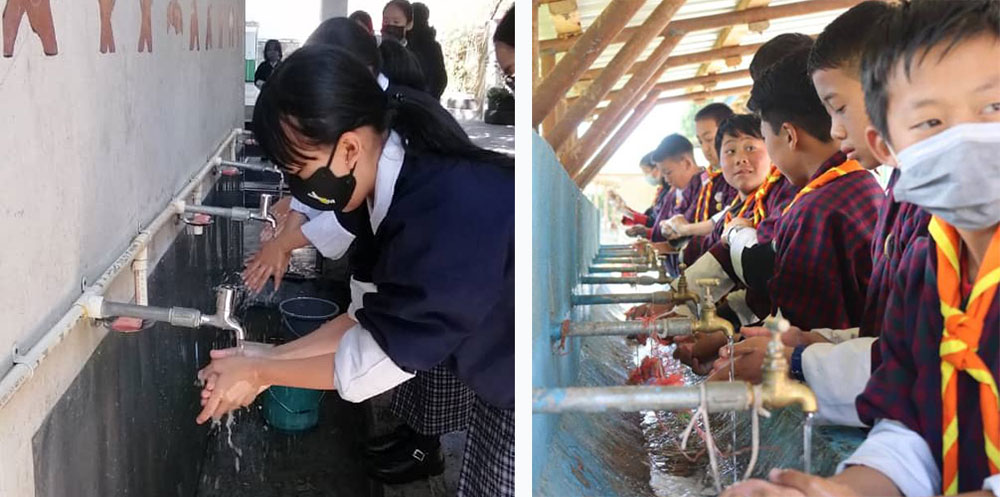Phurpa Lhamo | Gasa
At 10am yesterday, about 200,000 students in 605 schools across the country hit the water taps to scrub their hands as the country observed Global Handwashing Day. With sleeves raised to their elbows, they counted the 11 steps of handwashing.
Another 13,373 monks and nuns from 250 monastic schools also gathered to witness the in their institutions.
In 288 health care facilities across Bhutan, which receives 9,498 cases a day together individuals also stood to witness the day.
The Global Hand Washing day, which is on October 15th was celebrated a day earlier in Bhutan as the 15th was a Bhutanese national holiday.
A teacher from Gasa PS, Gyem Tshering said that students were taught how to make and use tippy taps.
He said, “With hand washing, we also learned about recycling because we had used jerry cans for tippy taps.”
Tippy taps are simple and economical hand-washing stations, made with commonly available materials and not dependent on a piped water supply.
Global Handwashing Day is an annual global advocacy day dedicated to promoting handwashing with soap as an easy, effective, and affordable way to prevent diseases and save lives.
The day themed “Our Future is at Hand – Let’s Move Forward Together,” calls on all of society to take collective action to work towards universal hand hygiene.

Students across the country participated in observing the day
According to the education ministry, schools recorded a 77 percent increase in handwashing facilities last year.
“Monastic institutions, health care facilities and public places across Bhutan have also recorded increased access to inclusive handwashing facilities. The government is partnering with SNV Bhutan, UNICEF and WHO and the private sector to strengthen Water, Sanitation and Hygiene (WASH) services and facilities across the country,” stated a joint press release from MoE, MoH, Religion and Health Project, SNV and UNICEF.
The press release stated that besides following other safety protocols, the collective adherence of the public towards handwashing with soap would help Bhutan sustain the success it has achieved in protecting the health of its people, especially during the pandemic.
A school health coordinator for 10 years at Zilukha Middle Secondary School in Thimphu, Yangchen Dema said that handwashing was today an ingrained habit among children in schools, which was strengthened with the response to the pandemic, especially improved water supply.
“Handwashing with soap has brought down the incidence of flu among students. Children don’t fall ill as they used to and do not miss school,” Yangchen Dema said.
The Global Handwashing Day was also to acknowledge the services of health coordinators in schools and monastic institutions, and health workers across the country.
A senior health assistant at Lajab Primary Health Centre in Dagana, Dawa Dema said that she always visited schools and villages to engage the communities on the importance of handwashing with soap.
“We observed the day during our out-reach clinic visit to Balung chiwog and showed them how to use the pedal handwashing station and reinforced the benefits of handwashing,” she said. More than 30 residents visited the outreach clinic at Balung.
At Genzin Dratshang in Mongar, Lopon Tashi shared the importance of hand hygiene with the school’s 55 monks. “We always observe the day, which is an opportunity to emphasise the importance of handwashing with soap and sanitation.”
The latest State of the World’s Hand Hygiene report by UNICEF and WHO states that investing in hand hygiene yields huge returns. One estimate places the economic savings associated with hand hygiene policies at on average 15 times the cost of implementation, stated the press release.
“Globally, current progress rates must quadruple to reach universal hygiene by 2030. In the least developed countries, the rate of progress would need to increase ten-fold, and in fragile contexts, it would need to accelerate by a factor of 23.”
The report identifies five accelerators that can enable governments to rapidly scale up access to hand hygiene – good governance, smart public finance, capacity building, consistent data, and innovation.
Edited by Tshering Palden


